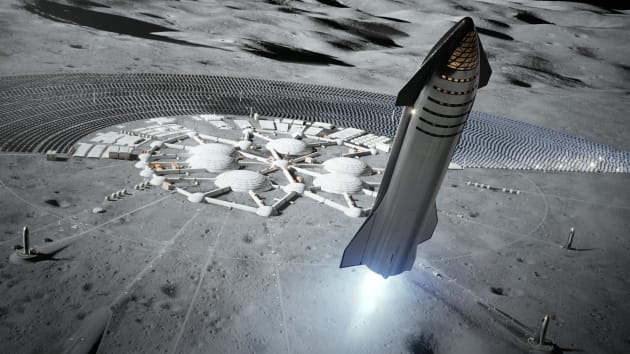Regulator Rejects Blue Origin’s NASA Lunar Contract Challenge

US’ Government Accountability Office rejects challenges by Blue Origin and Dynetics after NASA awarded $2.9bn lunar lander contract to Elon Musk’s SpaceX
A US watchdog has rejected Blue Origin’s challenge of NASA’s $2.9 billion (£2bn) lunar lander contract deal with SpaceX, paving the way for the Artemis manned mission plan to get underway.
The Government Accountability Office (GAO) also rejected a similar protest from military contractor Dynetics.
Both it and Blue Origin, founded by Amazon’s Jeff Bezos, had challenged NASA’s decision to award the lunar lander contract to a single company, Elon Musk’s SpaceX, rather than awarding multiple contracts.
In the two actions, filed in April, Blue Origin and Dynetics said NASA’s actions broke contracting law, since it had said it could award contracts to up to two companies.

‘Fundamental issues’
The GAO found NASA “reserved the right to make multiple awards, a single award, or no award at all”.
The regulator said it “denied the protest arguments that NASA acted improperly in making a single award to SpaceX”.
Blue Origin said it continued to believe there were “fundamental issues” with the contract decision which the GAO was not able to address “due to their limited jurisdiction”, and said it would continue to advocate for two contractors.
The company had argued NASA’s decision was unfair as it had allowed SpaceX to revise its pricing.
NASA said the GAO’s decision would allow it to move ahead with the Artemis programme.
“GAO’s decision will allow NASA and SpaceX to establish a timeline for the first crewed landing on the Moon in more than 50 years,” the agency said in a statement.
Elon Musk responded to the news by posting the word “GAO” on Twitter along with a flexing bicep emoji.

Manned mission
NASA is seeking to send humans to the surface of the Moon for the first time since 1972, as the 50th anniversary of the Apollo 17 mission approaches.
The agency awarded SpaceX with a contract to build its Starship lander with the intent to use it to bring humans to the Moon’s surface as early as 2024.
NASA didn’t say whether it still had that target date in mind following the three-month procedural delay, but said it is “moving forward with urgency”.
Last week Bezos offered to personally cover up to $2bn in NASA costs if the agency offered it a lunar lander contract.
It offered to waive payments of up to $2bn and pay for an orbital mission to test its technology, as well as covering any system development cost overruns.
“Without competition, NASA’s short-term and long-term lunar ambitions will be delayed, will ultimately cost more, and won’t serve the national interest,” Bezos said in an open letter to NASA administrator Bill Nelson.

SpaceX’s Starship
Last month Bezos flew to the edge of space along with three other passengers aboard Blue Origin’s New Shepard capsule.
Blue Origin had proposed to build its $6bn Blue Moon lunar lander for NASA with subcontractors including Northrop Grumman and Lockheed Martin. The company said its offer to NASA still stands.
NASA has said it plans to run three Artemis missions in all, beginning with an uncrewed flight.
The second mission would take astronauts around the Moon and back aboard NASA’s Orion capsule, without landing.
The third would take humans to the Moon’s surface in SpaceX’s Starship, which would ferry them from Orion to the lunar surface.
“As soon as possible, NASA will provide an update on the way ahead for Artemis, the human landing system, and humanity’s return to the Moon,” NASA stated.